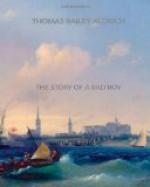We glided out from the crowd and silently wended our way through a neighboring alley, at the head of which stood a tumble-down old barn, owned by one Ezra Wingate. In former days this was the stable of the mail-coach that ran between Rivermouth and Boston. When the railroad superseded that primitive mode of travel, the lumbering vehicle was rolled in the barn, and there it stayed. The stage-driver, after prophesying the immediate downfall of the nation, died of grief and apoplexy, and the old coach followed in his wake as fast as could by quietly dropping to pieces. The barn had the reputation of being haunted, and I think we all kept very close together when we found ourselves standing in the black shadow cast by the tall gable. Here, in a low voice, Jack Harris laid bare his plan, which was to burn the ancient stage-coach.
“The old trundle-cart isn’t worth twenty-five cents,” said Jack Harris, “and Ezra Wingate ought to thank us for getting the rubbish out of the way. But if any fellow here doesn’t want to have a hand in it, let him cut and run, and keep a quiet tongue in his head ever after.”
With this he pulled out the staples that held the lock, and the big barn door swung slowly open. The interior of the stable was pitch-dark, of course. As we made a movement to enter, a sudden scrambling, and the sound of heavy bodies leaping in all directions, caused us to start back in terror.
“Rats!” cried Phil Adams.
“Bats!” exclaimed Harry Blake.
“Cats!” suggested Jack Harris. “Who’s afraid?”
Well, the truth is, we were all afraid; and if the pole of the stage had not been lying close to the threshold, I don’t believe anything on earth would have induced us to cross it. We seized hold of the pole-straps and succeeded with great trouble in dragging the coach out. The two fore wheels had rusted to the axle-tree, and refused to revolve. It was the merest skeleton of a coach. The cushions had long since been removed, and the leather hangings, where they had not crumbled away, dangled in shreds from the worm-eaten frame. A load of ghosts and a span of phantom horses to drag them would have made the ghastly thing complete.
Luckily for our undertaking, the stable stood at the top of a very steep hill. With three boys to push behind, and two in front to steer, we started the old coach on its last trip with little or no difficulty. Our speed increased every moment, and, the fore wheels becoming unlocked as we arrived at the foot of the declivity, we charged upon the crowd like a regiment of cavalry, scattering the people right and left. Before reaching the bonfire, to which someone had added several bushels of shavings, Jack Harris and Phil Adams, who were steering, dropped on the ground, and allowed the vehicle to pass over them, which it did without injuring them; but the boys who were clinging for dear life to the trunk-rack behind fell over the prostrate steersman, and there we all lay in a heap, two or three of us quite picturesque with the nose-bleed.




